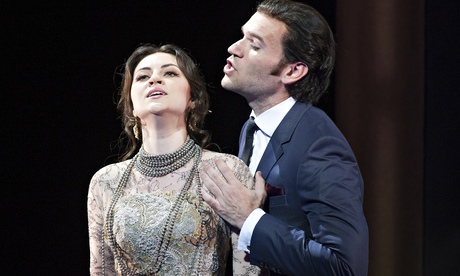
Family tensions, like death and taxes, are unavoidable. However changed our society may be, however liberated, Verdi's quintessentially 19th-century tragedy La traviata has at its core the unfashionable and yet undeniably timeless and often disturbing notion that family reputation still matters.
Tom Cairns's superb new production for Glyndebourne uses this tension to lift the piece out of its belle epoque straitjacket and place it in suspended time, both faithful to its roots but also modern and relevant. That's an achievement in itself, but fuse it with a stellar cast and inspirational conducting and a very rare alchemy begins to bubble.
Vital to that process is an outstanding soprano to sing Violetta, the Dame aux Camélias, the enchanting yet disillusioned courtesan who finds genuine happiness only to give it up to save her lover's family's reputation. This production has a sensation in Venera Gimadieva, whose voice seems limitless in its range of colour, from declamatory fortissimo to wafer-thin, consumptive pianissimo. And she looks fabulous.
In the Act I party scene Gimadieva seems to have stepped out of a Manet portrait, her dress full and high-necked, her hair close, her eyes dark and flashing, but that's the limit of 19th-century representation in this production. Violetta's guests, in designer Hildegard Bechtler's timeless evening wear, could have stepped out of the audience. Bechtler's set continues the limbo feel, but cleverly suggests Violetta's two worlds, with an uncompromising backdrop for life's hard realities on one side and a cushioned inner world of softer sentiment on the other.
Into this duality arrives Alfredo, her impetuous young lover. Again, the casting is spot-on. American tenor Michael Fabiano has the looks and presence for the part and a beautiful lithe timbre for his silky declarations of devotion, but when the going gets anguished he sweeps that aside and unleashes some thrilling firepower.
Chief cause of that anguish is Alfredo's father, Giorgio Germont, who appears unexpectedly at the lovers' country hideaway and appeals to Violetta to give up his son so that his daughter's impending marriage will not be mired in scandal. Cairns directs this central confrontation with masterly precision. Germont (imposing Tassis Christoyannis), clearly moved by Violetta's protestations, is nonetheless implacable in his determination, but we see clearly that he knows he has misjudged Violetta and why later he will defend her when wronged by Alfredo.
There are some impressive voices in the smaller roles: Graeme Broadbent's Dr Grenvil is suitably sonorous, a perfect pairing with Magdalena Molendowska's Annina, Violetta's constant handmaid and nurse until the last. Bechtler's design dictates some radical rethinking of the final scene, successfully moving it away from a mawkish gathering around a centre-stage deathbed towards a more fluid and agile denouement. This consumptive is alert until the last, just as Verdi's music suggests.
And driving it all, sensitive to every nuance and every brilliant colour in the score, is the conductor Mark Elder, keeping the London Philharmonic on a tight leash, never letting them overwhelm the voices and maintaining brisk and fiery tempi at all times.
With a team this thrilling and a production so intelligent, Glyndebourne has a sure-fire hit on its hands.
Dancing hotdogs, singing sausages, croaking frogs and oxen in sunglasses – they all have their place in HK Gruber's strange cabaret opera, Gloria: A Pigtale, Mahogany Opera Group's amusing debut production, staged last week at the Linbury Studio before going to the Buxton festival (Wednesday and Saturday) and Bregenz.
On paper it seems a crazy tale of vain and simpering Gloria, a pig who falls in love with a butcher before having her bacon saved by a lumbering boar called Rodney, but Gruber is satirising us all in an Animal Farm-like fashion; how the group (the sty) can pick out an individual (Gloria) for condemnation and rejection; how our own desires, physical or material, can blind us to the truth.
It's a sizzling burlesque, with the cast of five playing myriad parts, rushing on in ever more ludicrous costumes, embracing stylised movement and dance along the way and all the time coping with a fiendish score which crams a pig-and-whistlestop tour of all things Viennese (Mahler, Weill and Schoenberg) into 90 frantic minutes. (And there are so many references to The Muppet Show that it should be renamed "Miss Piggy, the Opera".)
While Gillian Keith makes a wonderfully empty-headed, though vocally pin-sharp, Gloria ("the sexiest sow in Soho" in Amanda Holden's deft translation, which mines every pun known to pig), ultimately this is a team production, with Sion Goronwy, Andrew Dickinson, Jessica Walker and Charles Rice excelling in their multiple sausage skins.
Director Frederic Wake-Walker partly redeems the recent tepid reception of his Glyndebourne La finta, his fertile imagination ably assisted by Mamoru Iriguchi's primary-coloured design and Cis O'Boyle's cabaret lighting. The highest praise, though, has to be reserved for conductor Geoffrey Paterson, who, on stage throughout and surrounded by mayhem, guided the singers and the ever-admirable CHROMA ensemble through the crackling, kaleidoscopic score with ice-cool assurance.
Star ratings (out of 5)
La traviata *****
Gloria: A Pigtale ***

